SC abortion ban renews focus on representation in government. 'We held off a total ban.'
- Oops!Something went wrong.Please try again later.
Earlier this year, when South Carolina's political class trained all its energies on the fight over abortion rights, the disparities in representation and the lack of women in public office became apparent, especially to the women themselves.
Split sometimes over partisan lines, those who oppose bans were critical of the overrepresentation of men in policy-making. Meanwhile, those advocating for abortion bans said women played an active role in leading the anti-abortion movement, not just men.
The difference between red and blue became more and more pronounced for the women in the South Carolina House. Twenty women unified on party lines and represented the battle lines surrounding the question of abortion access in the U.S.
Eight Democratic women led the opposition to the abortion ban. They brought up nearly 1,000 amendments that dealt with the complexities of pregnancies, child care and support.
Meanwhile, Republican women argued they were listening to the constituents who elected them. Gender dynamics of the legislature and the judiciary did not matter, they said, what mattered was staying true to the pro-life platform.
But things were different across the lobby.
Advocating for SC voters to elect more women to legislature
Five of the female lawmakers in the Senate—three Republicans, one Democrat and an Independent, created a bipartisan coalition to argue the current law was a catalyst for forced birth.
First, they banded together to avert a near-total abortion ban. Three Republican men joined them in the effort.
"The biggest proponents of the Human Life Protection Act are also the same proponents of constitutional carry, school choice, parental rights and regulating vaccines for everyone, especially children," Sen. Katrina Shealy, R-Lexington, said on the Senate floor, on April 27. Shealy was elected to the Senate 11 years ago, and she was the only woman in the chamber at the time.
Next, they tried to challenge a six-week abortion ban but lost when the three Republican men rescinded their support.
All five senators— Shealy, Sen. Sandy Senn from Charleston, Sen. Penry Gustafson from Kershaw County, Sen. Margie Bright Matthews from Orangeburg and Sen. Mia McLeod from Richland, identified as "pro-life" and differed on when an abortion ban was appropriate.
But they all agreed that six weeks was not enough time for a woman. They argued that only women who were capable of birthing children could understand the complexities of pregnancy.
They are now advocating for voters to elect more women to the legislature to move away from the optics of a few men deciding the fate of the reproductive rights of 51% of the state.
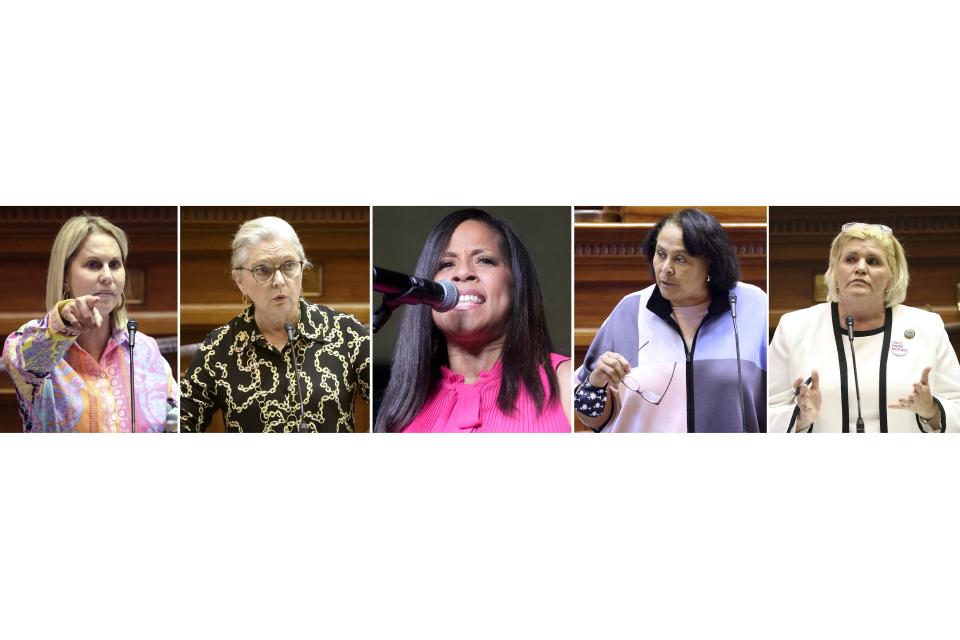
The "sister senators" received the John F. Kennedy Profile in Courage Award on Oct. 29 for successfully stalling a near-total abortion ban and finding common ground despite immense opposition.
"The reality though is if we had two more women who were reasonable, we would have won and we would not have a six-week ban," Senn said during the Oct. 29 award ceremony. "But we held off a total ban so for that I’m thankful.”
The question of whether more female representation in the Statehouse can change the tides of an abortion ban has rarely been as nuanced as it is today. Across the U.S., abortion rights have shown to have an enduring influence in electoral politics with voters in Republican-led states like Ohio and Kentucky indicating their intention to preserve abortion rights.
The five had attempted to pass a proposal to make abortion a ballot issue last session, but that effort failed, and is unlikely to gain muster in the legislature as it required a two-thirds vote in both chambers.
"Getting mad will not help. Finding a solution by casting out the extremes will help. And electing more women will help," Senn continued.
All-male SC Supreme Court: Separation of powers or political gaslighting? SC's six-week abortion ban again in effect
'Three competitors who say that I'm not Republican enough'
In South Carolina, a longtime Republican bastion, abortion access and reproductive rights have also laid bare the party infighting in the state's GOP where most of the conflict has seemed to boil down to proving who is more conservative.
The Republican female senators, Senn, Shealy and Gustafson, are already on track to face primary challengers.
"I have three competitors who say that I'm not Republican enough— already! We're not even supposed to file until March," Senn said during the Oct. 29 award ceremony. "But anyway, that's okay. They want a challenge, a challenge they will get."
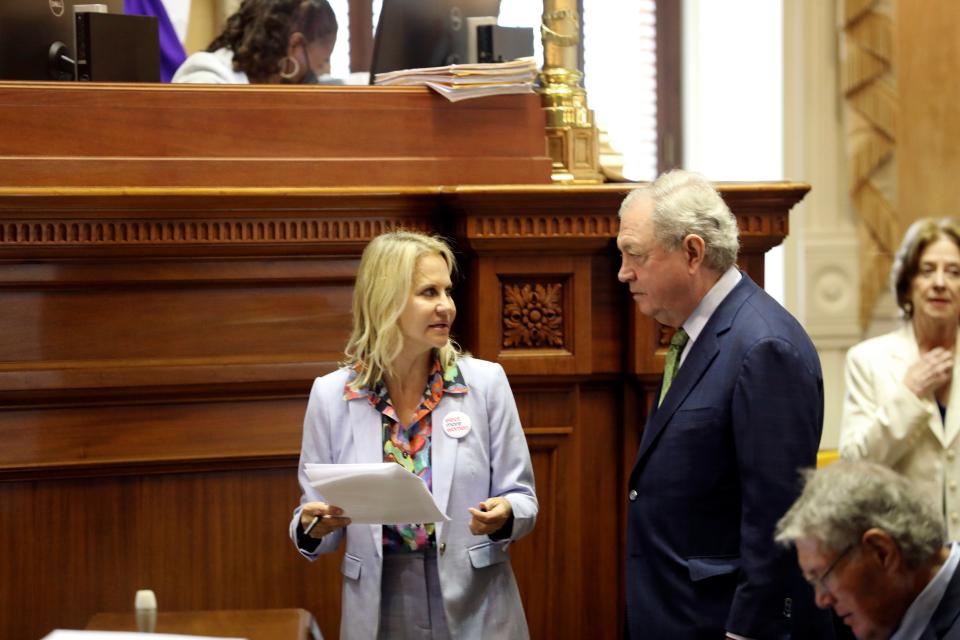
'Why aren't y'all up here defending? Why are the men speaking for you?'
Back when she was a newly inducted lawmaker, Pelzer Republican Ashley Trantham stuck to a simple strategy: sit back, watch and learn from her peers.
It was 2018 and Trantham knew previous attempts at passing restrictive abortion bans had yielded no success. Bills continued to die in committee before they could make it to the floor, and the possibility of setting the stage to overturn Roe v. Wade seemed far away.
A breakthrough came in 2019 when a version of a six-week abortion ban survived the committee process.
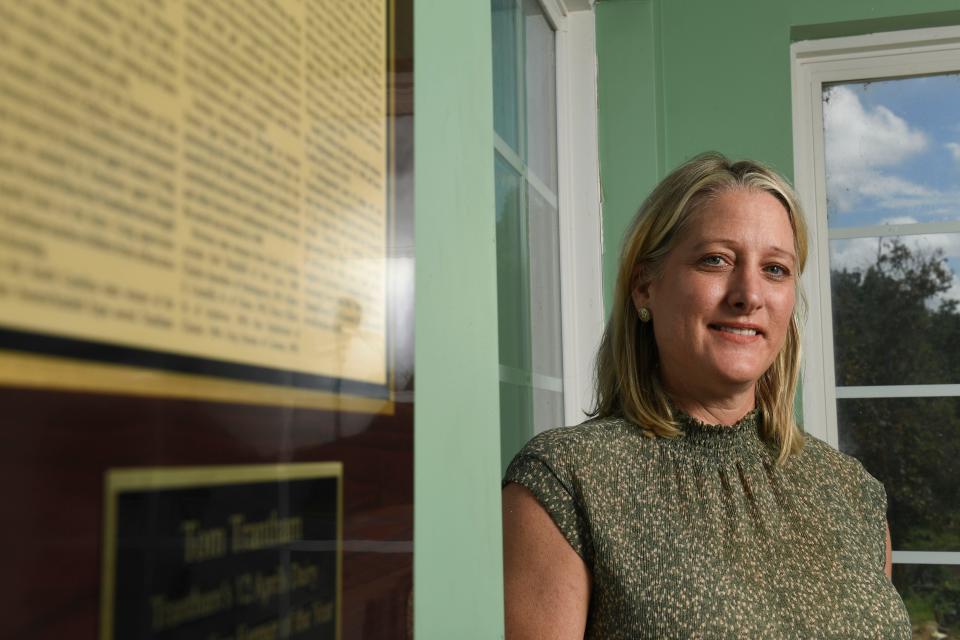
On the House floor, member after member walked up to the well to argue in favor or against the ban. But a strange silence enveloped Trantham, only to be interrupted by the messages on her phone.
She peered at her phone screen.
Concern about the optics of the debate deepened in the group chat she had with other Republican women.
“(Abortion rights activists) were calling us out and saying where are our Republican women?" Trantham recalled reading. "Why aren't y'all up here defending? Why are the men speaking for you?”
That struck a nerve. Trantham said women had to be at the forefront of representing their core values. "I will never sit here and not stand up for life and be vocal about it. I'm not doing that again," she said, adding that South Carolina had a Republican supermajority in the Statehouse and should've been able to pass a strict abortion ban.
However, she was quick to add that it did not matter if gender played a role in policymaking even as she yearned to see more conservative women at the forefront.
"When people ask me about women's rights, I think there needs to be equal opportunity for qualified people," Trantham said. "But just because you're a woman doesn't mean that you're more qualified than the man running for that seat."
Republican men introduced majority of anti-abortion bills
Amanda Roberti, a professor at San Francisco State University, has studied abortion policy and its connection with representation for years.
In her research, Roberti argued that though the push to pass anti-abortion policies had been a movement since the original Roe v. Wade decision in 1973, they had always remained in the margins, never gaining the mainstream legitimacy they enjoy today.
Numerically, Republican men introduced the majority of anti-abortion bills. That is still true today.
Last session, 16 bills targeting abortion rights were introduced by lawmakers on both sides of the political spectrum.
Proposals ranged from legislative nudges to make abortion a ballot question, introducing tax credits to residents donating to anti-abortion non-profits or eliminating penalties for women who may be party to a case of a self-managed abortion.
Of the seven bills that focused on amending or introducing a new version of an abortion ban, six were sponsored by men.
Resolution to shutter Women's Clinic: Greenville County councilmember to introduce resolution to shutter Women's Clinic
Nevertheless, things shifted between 2008 and 2017. Roberti recorded a precipitous rise in the number of abortion bans filed in state legislatures. Several bills were also making their way to debate floors and stood on the cusp of passage. So what caused the shift?
Roberti said the advent of the Tea Party movement in 2010 saw more Republican women begin getting elected into state legislatures. The movement also coincided with a reframing of gender issues from a conservative woman's point of view.
Where previous bills focused primarily on personhood and protection of fetal life, newer efforts were framing anti-abortion policies as "pro-woman" or in “women’s best interests," Roberti continued.
'People are not sitting around taking a pregnancy test every day'
S.C. Citizens for Life President Lisa Van Riper, a popular name in the Upstate, who has long advocated for the passage of abortion restrictions in the state gave weight to Roberti's research.
“Women ought not to be treated as morons who can't make choices," Van Riper said, endorsing an argument surrounding "informed choice" that took center stage in the Supreme Court's abortion ruling. "As a woman, I have a choice when I have sex, whether I'm going to use birth control or not, and so what happens if you skipped all of those choices? Well, then as soon as you are late with your period, you take a pregnancy test."
Healthcare advocates and lawyers have rejected this notion of inadvertently penalizing women. "As a practical matter, that is not what women are doing," Catherine Humphreville, attorney for abortion providers said during the June 27 oral arguments. "People are not sitting around taking a pregnancy test every day. They have jobs, they have children, they have other determinations, they're not regularly tracking their menstrual cycles, and so that doesn't change anything."
Freshman lawmaker and S.C. Freedom Caucus member April Cromer, R-Anderson, did not think frequent pregnancy tests were a burden. She felt that women were being made to think that an abortion was necessary to succeed, often spotlighting a religious point of view.
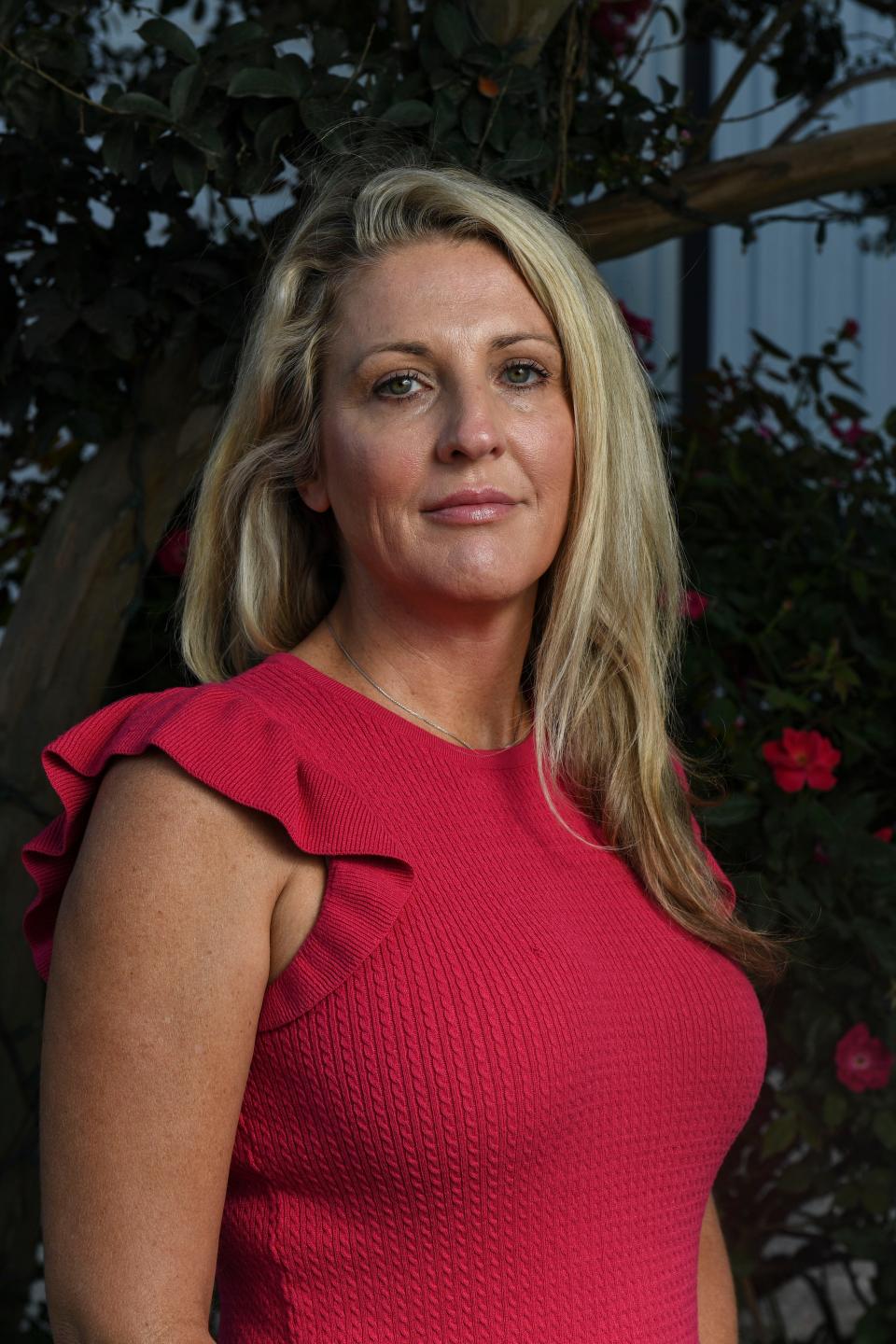
"Abstinence is very important," she continued, adding that schools were to be blamed for the sex education children were receiving. "We can't look to the government and the schools. We have to look to the church and the parents. The parents are the primary stakeholders. That's where it begins," she said, adding that her constituents were tired of the status quo. "Especially here in South Carolina where Christian values family values, a hard-working community are so important to us."
Cromer's comment about challenging the status quo held a lot of weight. The Anderson lawmaker defeated a 22-year incumbent, former Rep. Brian White, who had also served as the chair for the powerful House Ways and Means committee.
Are loss of abortion rights akin to a loss of citizenship rights?
Rosalyn Henderson Myers, D-Spartanburg, was one of the eight female Democrats in the House who challenged the six-week abortion ban.
"So many of us have had Republican women come up to us and say that they don't feel like this is a partisan issue," Henderson Myers said. Lack of abortion access could force vulnerable mothers unable to care for their children in untenable situations, she said. That women who were victims of incest, rape or sexual assault were at risk of being retraumatized as they would have to report and revisit sordid details of their suffering.
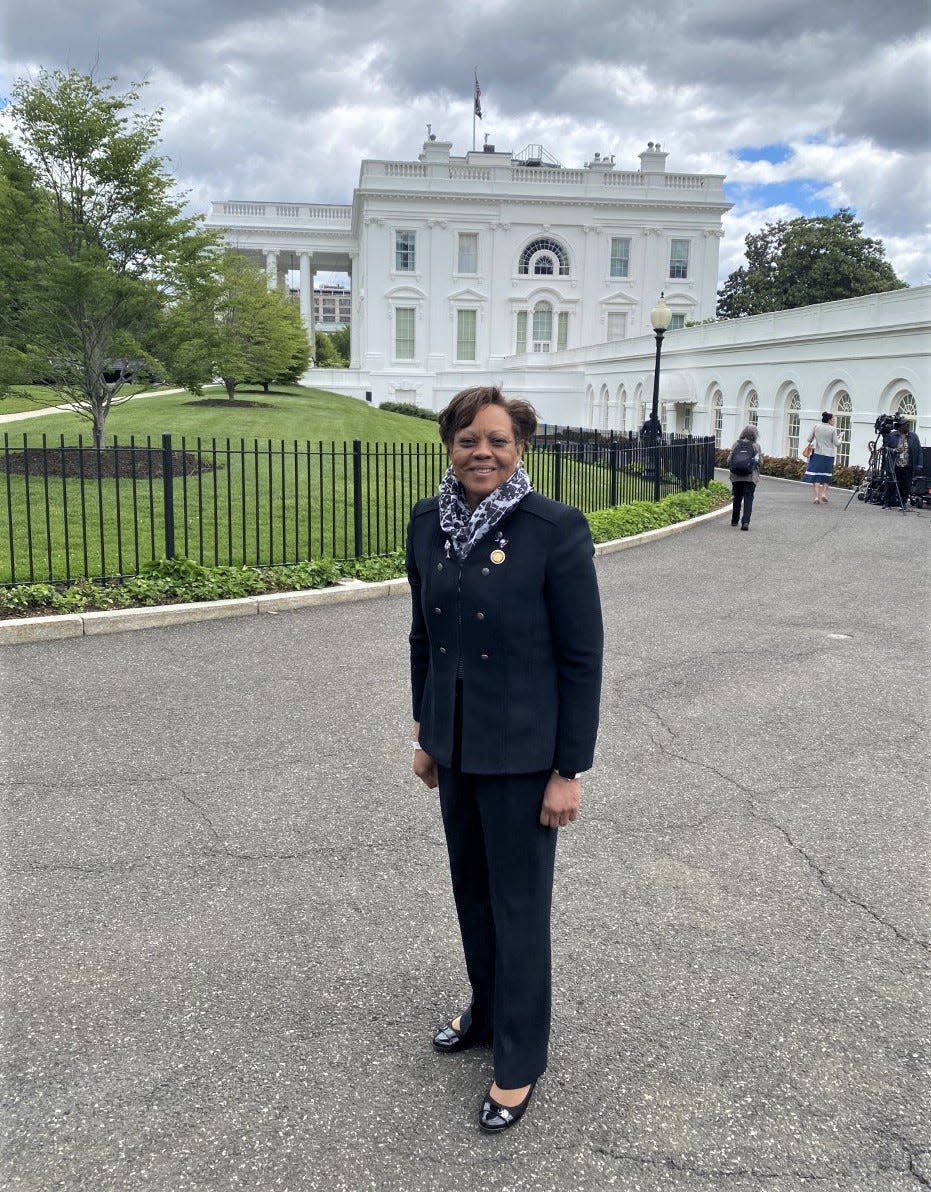
Then there were infrastructural barriers. In South Carolina, 14 of 46 counties don't have a dedicated OB-GYN, and a lack of transportation resources has women driving for hours between facilities that offer prenatal or post-partum care. A recent maternal mortality report also showed that 82% of the pregnancy-related deaths recorded in 2019 were preventable if patients had access to critical care.
"There's a lot of kind of consequences of not being able to control one's reproduction," Roberti said, adding that recent public and sociological research has primarily focused on what happens in the absence of control. "When it's denied, there's all these negative consequences. Women take risks."
One example of a potentially dangerous situation came in 2021 when a 33-year-old Greenville woman allegedly self-administered an abortion pill to terminate a pregnancy. The woman, who was later taken to the hospital due to labor contractions, delivered a stillborn fetus. The hospital notified the police department and the woman was arrested for taking an abortion pill illegally.
The charges were later dismissed on Oct. 18 citing insufficient evidence and "legal issues," court records show.
But the case may just be a preview of what could be a tenuous relationship between healthcare providers, their patients and the law. The current ban holds medical professionals liable for conducting abortions.
Crisis pregnancy centers: SC gives medical contracts to crisis pregnancy centers. Lack of regulations raise concerns.
"Medical understanding is not present in anti-abortion laws," Roberti said. "There's no medical reason for doing any of this. It's political."
The crux of the matter is that a pregnant person unable to access the choice of abortion is stripped of personal freedom that is part of their "citizenship rights."
"It doesn't necessarily always mean that the pregnant person is going to get an abortion," she said, adding that citizenship rights included the right to parenting and safe places, having resources, access to health care, prenatal—things that are going to make pregnancy and a child thrive.
Still, Henderson Myers said she was not surprised at the partisan nature of the votes in the House that eventually led to the passage of the abortion ban."The House in particular has been so polarized on party lines, and it really doesn't matter what the issue is. The Republican Party decided what they want to do and so women are falling in the party line and voting against their own interests."
Winthrop poll: 37% support abortion ban, 43% opposed
According to a May 2023 Winthrop poll, 37% of South Carolina residents polled said they supported a ban on most abortions after six weeks. Meanwhile, 43% said they opposed it. The poll also revealed a partisan divide where over half of the Republicans supported the ban and just over a quarter of Democrats felt the same way.
But a majority of the state supported the legality of abortions in circumstances where the mother's life was in danger, or if the pregnancy was a result of incest and rape.
The polling certainly has not been easy, Poll Director Scott Huffmon said in the published findings. "The six-week ban elicits strong emotions," Huffmon said in the press statement. "We decided to err on the side of full information when designing the question. We offered arguments from both sides and used medically accurate terminology in hopes of getting real opinions and not just emotional reactions.”
When asked if she agreed with the polling, Cromer said she questioned the polling methodology and demographics. "I'm there for my constituents. That's why I ran. Because we were not having the representation that we thought we were having," she said.
Glen Halva-Neubauer, a political science professor at Furman University, defended Huffmon's work and said the Winthrop poll was "the gold standard of public opinion polling in South Carolina".
Cromer reemphasized her desire to listen to what her constituents wanted. Hers was not a statewide office, she said. Her main concern was her district.
But is that what all of the residents in her district want?
“I don't think it's wrong for legislators to say they're representing their people," Halva-Neubauer said. "The question is— who are the people?"
Lynn Teague, associated with the League of Women Voters, said only 10 of 124 House districts were competitive. Teague revisited the age-old problem with voting patterns. Most of the issues are decided in primaries and only the most vocal show up at polling stations and cast their vote. "This is a problem for our democracy," Teague cautioned. "The House members are reflecting the people who vote for them but not necessarily their constituents. Big difference."
What to expect in 2024
On the Senate side, Majority Leader Shane Massey, R-Edgefield, indicated there would be no substantial change in the upcoming year. "I think we need to let this settle and let's see how this plays out in South Carolina before we start doing anything else," Massey said after the Supreme Court ruling.
In the past two sessions, lawmakers have been unable to pass a ban as the Republicans in the Senate did not have enough votes to counter a filibuster. Massey said the relentless pursuit had been mentally draining for lawmakers.
Cromer was disappointed with Massey's comments. "I'll never get tired of fighting for babies," Cromer said.
Trantham and Cromer, who are part of the Freedom Caucus, will be working with lawmakers to pass amendments to the abortion ban to remove exceptions. "There's some people that don't have a stomach for that," Trantham said, explaining why passing a ban without exceptions has proven to be difficult to pass.
While the two don't expect much to change next year, they believe the 2024 elections could move the South Carolina Statehouse more toward the right and add more lawmakers who would eventually pass a total abortion ban.
"I'm okay with baby steps until we get there and that's what we have to do," Cromer said.
Meanwhile, the Democrats have vowed to remind voters of the fallouts of an abortion ban.
"This cruel abortion ban is the same extremism MAGA Republicans are fighting to take nationwide, but this isn’t the end of our fight," S.C. Democratic Party Chair Christale Spain said. "South Carolinians will see the extreme legislators who made this happen at the ballot box next year."
Devyani Chhetri covers SC politics for the Greenville News. You can reach her at dchhetri@gannett.com or @ChhetriDevyani on X.
This article originally appeared on Greenville News: To be a woman: SC abortion ban renews focus on representation

